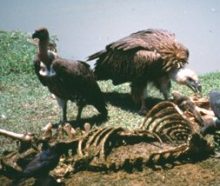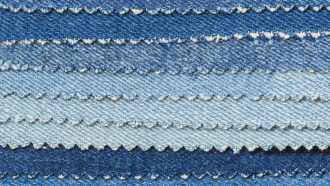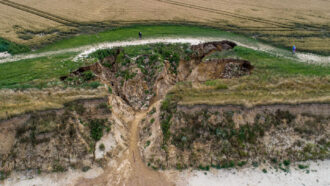A vulture’s hidden enemy
Vultures may be getting a deadly dose of medicine from the carcasses they feed upon.
Vultures are scavengers, feeding on the meat from whatever dead animals they can find. But in Pakistan and India, vultures that have been feeding on dead farm animals, such as cattle, have been dying off themselves.
Scientists have just discovered that these deaths occur because the vultures are getting an accidental dose of medicine from the cattle meat. Farmers had given a drug to their livestock to heal the animals. To vultures, however, the drug turned out to be poisonous.
 |
|
Oriental white-backed vultures make short work out of an animal carcass.
|
| M. Virani |
Finding the cause of the vultures’ deaths was like solving a mystery. At first, researchers thought the birds might have been dying of some mysterious plague.
Veterinarian J. Lindsay Oaks at Washington State University examined the internal organs of some dead birds to check for signs of disease. No disease. Instead, Oaks discovered that the birds’ kidneys had failed—not due to disease but due to poisoning.
Scientists already know that certain chemicals, such as the metal cadmium, are harmful to birds’ kidneys. But in their tests on the vultures, Oaks and his colleagues found no traces of cadmium or other familiar, harmful substances.
Next on the scientists’ list of suspects were any drugs used to treat livestock. The researchers checked to see what drugs farmers in the area used. They noticed one drug on the list known to hurt birds’ kidneys if the birds eat something with the drug in it. The culprit is called “diclofenac,” a veterinary medicine used by farmers in Pakistan and India to shrink swellings.
Losing the vultures could have all sorts of unwanted side-effects. With fewer vultures around to devour animal carcasses, there’s less competition for food—allowing the number of foxes to increase. The increase in the fox population has led to the spread of rabies. It’s an example of the complex chain of unexpected effects that can occur in nature.
The vultures are useful to farmers, too. When an animal dies, a farmer can leave the carcass out in the open for vultures to dispose of. Without vultures, farmers would have to find new ways of dealing with waste carcasses.
The researchers say the vultures might recover if the farmers stopped using the drug. But that might not be so easy for the farmers.
The vultures don’t have much time, though. Rick Watson of the Peregrine Fund in Idaho claims that if farmers don’t do something, three species of vulture will die out within 5 years.
Going Deeper:
Milius, Susan. 2004. Vanishing vultures: Bird deaths linked to vet-drug residues. Science News 165(Jan. 31):69-70. Available at http://www.sciencenews.org/20040131/fob6.asp .
You can learn more about vultures in Pakistan at edu.iucnp.org/newbirds/pstory2.htm (World Conservation Union/IUCN).







